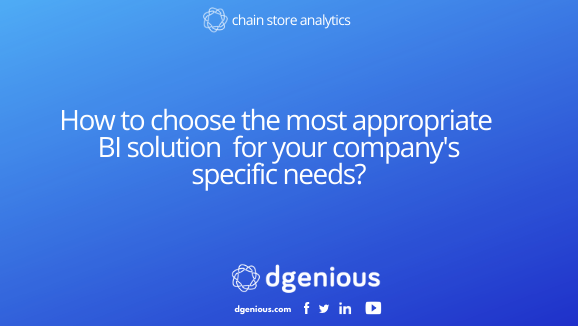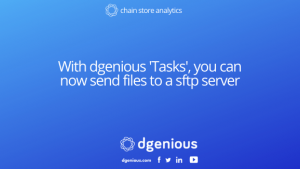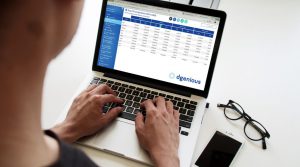
Understanding, analyzing, forecasting and monitoring the activities of your department or company is crucial to successful operational and strategic decision making.
This is nothing new and you are certainly already managing it with the means at hand!
But how do you choose the solution that best suits your needs and those of your company? The solution that will allow you to easily and quickly have all data at your disposal and help you make the right calls in real time?
Here are 3 key factors to consider.
Implementation time
Classic BI project often require very long implementation times, typically a couple of months and often more than a year. Thanks to their advanced technology, modern BI solutions such as dgenious are implemented within 2 and 8 weeks! The time frame depends on the number and complexity of the different databases and systems to be reconciled. Why is it possible? Because these technologies synchronize and store raw data so there is no time wasted creating old-fashioned “Cubes” and hard-wired pre-computations in the data warehouse.
Number of users
Traditional BI tools are licensed per user. The practical consequence is that, in order to keep costs low, only a few seats are purchased and these few users with a license are the only ones within the organization who can create/amend reports and are in charge of spreading reports throughout the company.
But in today’s business world, decisions must be made quickly with direct, real-time access to information based on everyone’s roles and responsibilities.
Modern tools such as dgenious are licensed per company. Coupled with a built-in advanced permissionning system and an intuitive self-service mode, this enabled a large number of internal and external users with a wide variety of roles (management, data analysts, finance, marketing, franchisees) to have a direct, real-time, secure access to their data.
It is Important to point out that, besides the technology, it is the philosophy that differentiates traditional BI solutions from modern ones: making real-time data available quickly, easily and without specific training to a large number of people within the organization in order to make the necessary operational decisions.
Total cost of implementation
When selecting the right BI solution it is all too tempting to compare only licensing costs, on the assumption that other costs are the same for all solutions… Serious error! Infrastructure costs, configuration fees, external licenses (data warehouse, ETL, …) and running costs are typically significant cost factors that can vary wildly across BI solutions.
Solutions such as dgenious aim to significantly reduce the total cost of ownership. Key aspects include:
- a simpler and faster set up as no cubes or precomputation of KPIs are required. Raw data is synchronized in real time in the data warehouse.
- a much lighter IT infrastructure as they cover and optimize the whole data process (acquisition – transformation – warehousing – visualization), not just one part of it.
So, the choice is yours! It’s up to you to make the right choice according to your needs and objectives. It is so easy and affordable today to have solutions that are fast, efficient, inexpensive and for a large number of users.
dgenious is the reporting solution specially developed to manage your distribution network in a secure, unified and dynamic way.Analyze your franchises, points of sale, campaigns, launches, stock, consumers… Juggle with your data. Create, modify, adapt and share your reports on demand, easily and quickly. In real time, without any special IT knowledge.
The technical point:
dgenious reconciles data from your different systems (cash register, stock, erp, crm,…) in real time and makes it available on your mobile, tablet or desktop computer.
dgenious has an advanced technology for managing permissions and authentication. This allows you to build permission profiles by dynamically combining various sources (AD/ldap, erp, different cash systems, manual management for certain users, etc.).
With this system, a franchisee only sees the sales and stock data of his outlets, whereas a logistics manager can see the orders and stock data of a whole country but has no access to sales or commercial conditions. A network manager or product manager can prepare a report and share it with categories of users (all franchisees and all logistics managers), and is assured that each will have access only to the appropriate scope of data.
For more secure, dynamic and unified management of your distribution network.



